Apparent Authority: Exploring Legal Principles and Case Studies
VerifiedAdded on 2023/01/19
|9
|2559
|90
Report
AI Summary
This report provides a comprehensive overview of apparent authority within the framework of agency law. It begins by defining agency and the roles of the principal, agent, and third party, emphasizing the fiduciary relationship inherent in such arrangements. The report then delves into the concept of apparent authority, differentiating it from express and implied authority, and explaining how it arises when a third party reasonably believes an agent has authority to act on behalf of a principal, even without actual authorization. The main body explores the application of apparent authority in various business scenarios, referencing relevant case laws like Castillo v. Case Farms of Ohio and Freeman and Lockyer v. Buckhurst Park Properties Ltd, to illustrate its practical implications. It also examines the requirements for establishing apparent authority, including the principal's role in creating the appearance of authority and the third party's reliance on that appearance. Furthermore, the report addresses the limitations and complexities of apparent authority, discussing how courts resolve disputes and the importance of clear communication to avoid misunderstandings. Finally, it highlights the key features of an agency relationship, including the necessary elements for apparent authority to exist, such as the absence of an actual agreement and the agent's representative capacity. Overall, the report offers a detailed analysis of apparent authority, its legal principles, and its impact on business transactions, with the aim of providing a clear understanding of this important aspect of agency law.
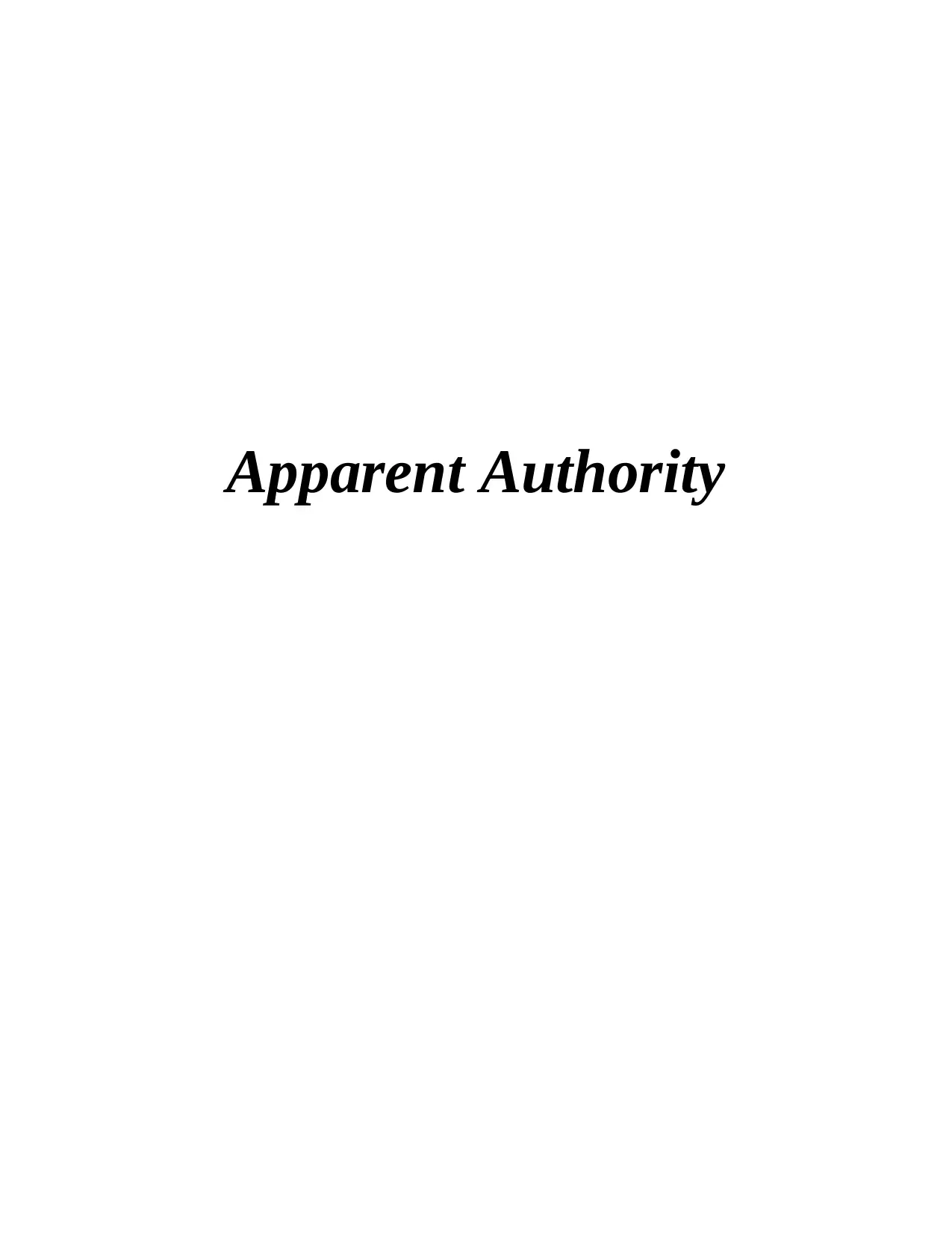
Apparent Authority
Paraphrase This Document
Need a fresh take? Get an instant paraphrase of this document with our AI Paraphraser
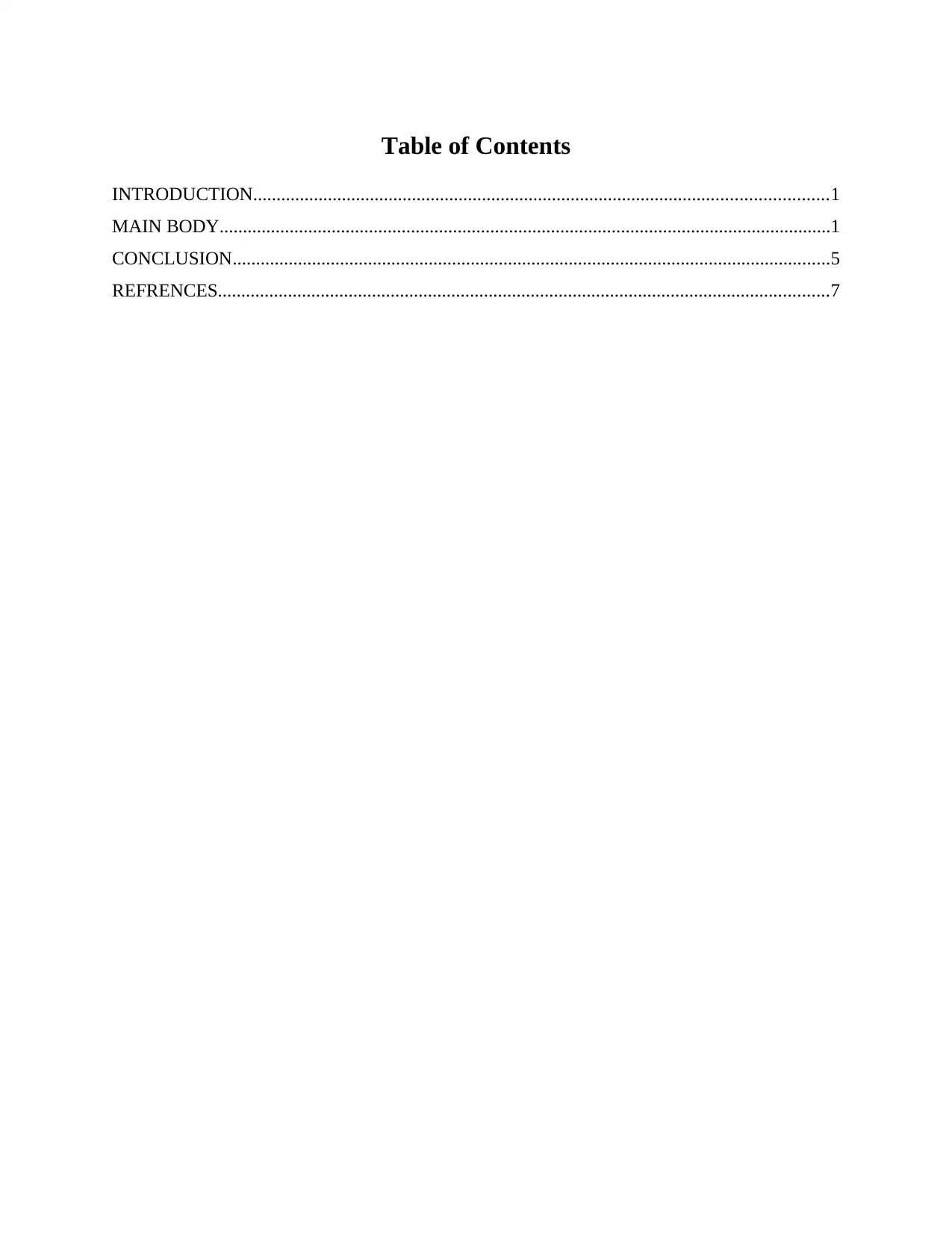
Table of Contents
INTRODUCTION...........................................................................................................................1
MAIN BODY...................................................................................................................................1
CONCLUSION................................................................................................................................5
REFRENCES...................................................................................................................................7
INTRODUCTION...........................................................................................................................1
MAIN BODY...................................................................................................................................1
CONCLUSION................................................................................................................................5
REFRENCES...................................................................................................................................7
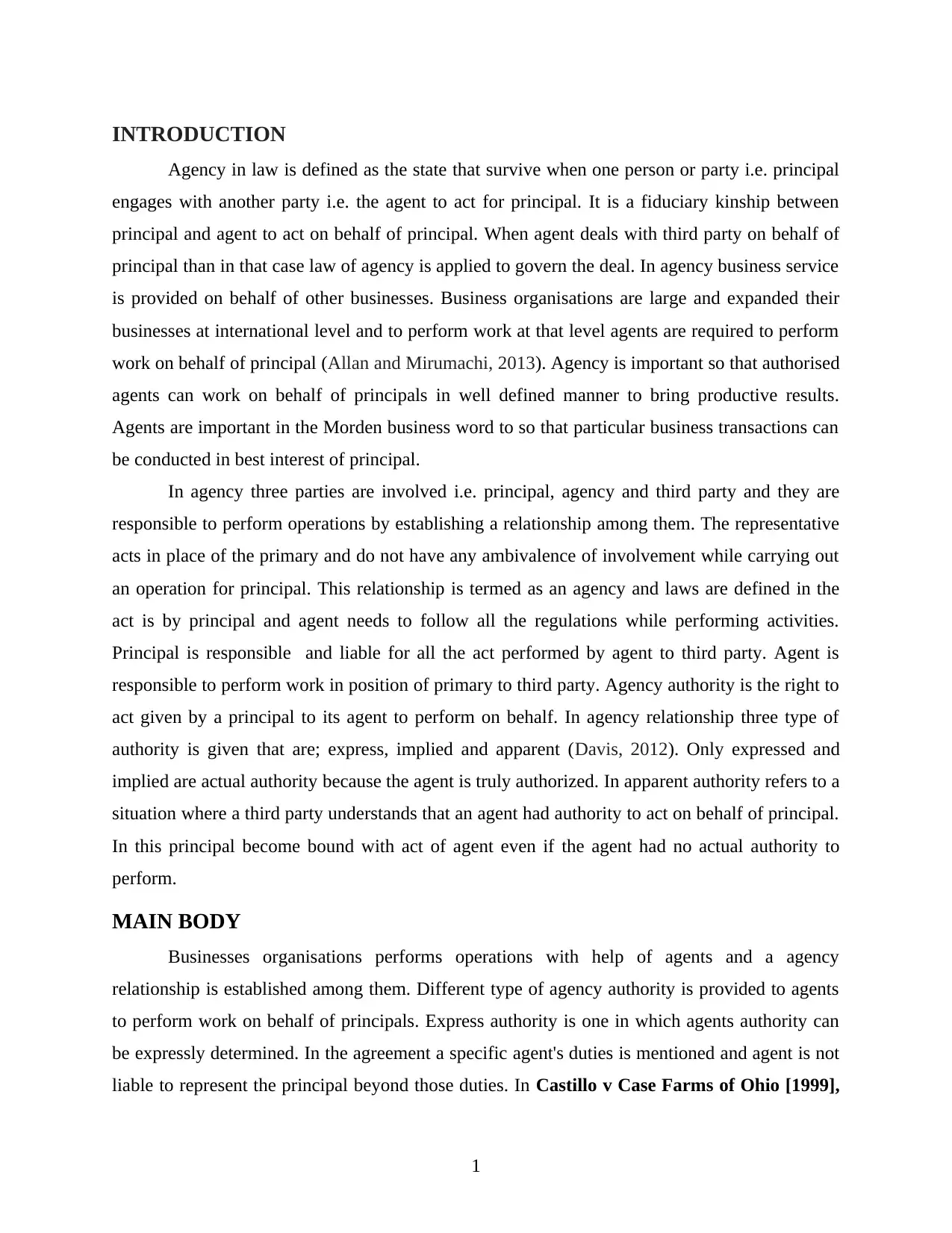
INTRODUCTION
Agency in law is defined as the state that survive when one person or party i.e. principal
engages with another party i.e. the agent to act for principal. It is a fiduciary kinship between
principal and agent to act on behalf of principal. When agent deals with third party on behalf of
principal than in that case law of agency is applied to govern the deal. In agency business service
is provided on behalf of other businesses. Business organisations are large and expanded their
businesses at international level and to perform work at that level agents are required to perform
work on behalf of principal (Allan and Mirumachi, 2013). Agency is important so that authorised
agents can work on behalf of principals in well defined manner to bring productive results.
Agents are important in the Morden business word to so that particular business transactions can
be conducted in best interest of principal.
In agency three parties are involved i.e. principal, agency and third party and they are
responsible to perform operations by establishing a relationship among them. The representative
acts in place of the primary and do not have any ambivalence of involvement while carrying out
an operation for principal. This relationship is termed as an agency and laws are defined in the
act is by principal and agent needs to follow all the regulations while performing activities.
Principal is responsible and liable for all the act performed by agent to third party. Agent is
responsible to perform work in position of primary to third party. Agency authority is the right to
act given by a principal to its agent to perform on behalf. In agency relationship three type of
authority is given that are; express, implied and apparent (Davis, 2012). Only expressed and
implied are actual authority because the agent is truly authorized. In apparent authority refers to a
situation where a third party understands that an agent had authority to act on behalf of principal.
In this principal become bound with act of agent even if the agent had no actual authority to
perform.
MAIN BODY
Businesses organisations performs operations with help of agents and a agency
relationship is established among them. Different type of agency authority is provided to agents
to perform work on behalf of principals. Express authority is one in which agents authority can
be expressly determined. In the agreement a specific agent's duties is mentioned and agent is not
liable to represent the principal beyond those duties. In Castillo v Case Farms of Ohio [1999],
1
Agency in law is defined as the state that survive when one person or party i.e. principal
engages with another party i.e. the agent to act for principal. It is a fiduciary kinship between
principal and agent to act on behalf of principal. When agent deals with third party on behalf of
principal than in that case law of agency is applied to govern the deal. In agency business service
is provided on behalf of other businesses. Business organisations are large and expanded their
businesses at international level and to perform work at that level agents are required to perform
work on behalf of principal (Allan and Mirumachi, 2013). Agency is important so that authorised
agents can work on behalf of principals in well defined manner to bring productive results.
Agents are important in the Morden business word to so that particular business transactions can
be conducted in best interest of principal.
In agency three parties are involved i.e. principal, agency and third party and they are
responsible to perform operations by establishing a relationship among them. The representative
acts in place of the primary and do not have any ambivalence of involvement while carrying out
an operation for principal. This relationship is termed as an agency and laws are defined in the
act is by principal and agent needs to follow all the regulations while performing activities.
Principal is responsible and liable for all the act performed by agent to third party. Agent is
responsible to perform work in position of primary to third party. Agency authority is the right to
act given by a principal to its agent to perform on behalf. In agency relationship three type of
authority is given that are; express, implied and apparent (Davis, 2012). Only expressed and
implied are actual authority because the agent is truly authorized. In apparent authority refers to a
situation where a third party understands that an agent had authority to act on behalf of principal.
In this principal become bound with act of agent even if the agent had no actual authority to
perform.
MAIN BODY
Businesses organisations performs operations with help of agents and a agency
relationship is established among them. Different type of agency authority is provided to agents
to perform work on behalf of principals. Express authority is one in which agents authority can
be expressly determined. In the agreement a specific agent's duties is mentioned and agent is not
liable to represent the principal beyond those duties. In Castillo v Case Farms of Ohio [1999],
1
⊘ This is a preview!⊘
Do you want full access?
Subscribe today to unlock all pages.

Trusted by 1+ million students worldwide

case was held on the facts that Migrant Farm Workers were recruited in Texas by America's
Temp-corps to work in Case Farm's Ohio-based chicken processing plan. Workers are provided
with a bus ticket and $20 for three days of food. Upon arriving they found themselves in living
conditions “distressing and deplorable” by the court. The working conditions were largely not
refuted (Castillo v Case Farms of Ohio, 1999). The issues in the case is whether American's
Temp-corps (ATC) was an agent of the Case farms. Another issue is whether agency existed or
not to make actions of ATC liable to Case Farms. As per Migrant And Seasonal Agriculture
Workers Protection Act and Fair Labour Standards Act the court entered into judgement for
farm workers. When there is expressed authority is provided by primary person to other than it
leads to generation of agency relationship. The Case Farms expressly authorised ATC to recruit
and hire people to work at Case Farms Ohio plant and it is an expressed authority. Case Farm
will be liable for all the actions of ATC in compliance with Agriculture Workers Protection
Act.
Implied authority can be implied by customs that determines the express duties of other
agents in the same position. In the Hely-Hutchinson v Brayhead Ltd [1968] this principal was
applied that agents that are in same position possess implied authority same as other agents event
not expressly provided to them. Apparent authority is based on the primary that when principal
grounds a 3rd party to consider that someone is an agent than primary will be bound for all the
activity of a agent. In case of Freeman and Lockyer v Buckhurst Park Properties Ltd [1964]
this principal was used to held the case. The idea of customary authority is essential to ascertain
the level of the agent's real and apparent authority. As Edmunds v Bushell and Jones this
principal was used to determine usual authority of a director in company.
Apparent authority reflects a state when a third party with the act of principal believes
that a particular person is agent and performing on behalf of the primary person. In that case
primary person will be held liable for all the acts performed by agent (Huemer, 2013). This
authority arises even when no expressed or implied authority is provided to agent for performing
a specific activity. Requirement of evident authorisation is that when any principal finds that
agent is not insufficient to perform all the task on behalf then with abolishing agency relationship
all the parties involved must be informed regarding this breach of relationship. Primary
individual required to inform all the third parties that agency relationship does not exist and will
not be their in future for any transactions. When principal do not perform his part of duty than in
2
Temp-corps to work in Case Farm's Ohio-based chicken processing plan. Workers are provided
with a bus ticket and $20 for three days of food. Upon arriving they found themselves in living
conditions “distressing and deplorable” by the court. The working conditions were largely not
refuted (Castillo v Case Farms of Ohio, 1999). The issues in the case is whether American's
Temp-corps (ATC) was an agent of the Case farms. Another issue is whether agency existed or
not to make actions of ATC liable to Case Farms. As per Migrant And Seasonal Agriculture
Workers Protection Act and Fair Labour Standards Act the court entered into judgement for
farm workers. When there is expressed authority is provided by primary person to other than it
leads to generation of agency relationship. The Case Farms expressly authorised ATC to recruit
and hire people to work at Case Farms Ohio plant and it is an expressed authority. Case Farm
will be liable for all the actions of ATC in compliance with Agriculture Workers Protection
Act.
Implied authority can be implied by customs that determines the express duties of other
agents in the same position. In the Hely-Hutchinson v Brayhead Ltd [1968] this principal was
applied that agents that are in same position possess implied authority same as other agents event
not expressly provided to them. Apparent authority is based on the primary that when principal
grounds a 3rd party to consider that someone is an agent than primary will be bound for all the
activity of a agent. In case of Freeman and Lockyer v Buckhurst Park Properties Ltd [1964]
this principal was used to held the case. The idea of customary authority is essential to ascertain
the level of the agent's real and apparent authority. As Edmunds v Bushell and Jones this
principal was used to determine usual authority of a director in company.
Apparent authority reflects a state when a third party with the act of principal believes
that a particular person is agent and performing on behalf of the primary person. In that case
primary person will be held liable for all the acts performed by agent (Huemer, 2013). This
authority arises even when no expressed or implied authority is provided to agent for performing
a specific activity. Requirement of evident authorisation is that when any principal finds that
agent is not insufficient to perform all the task on behalf then with abolishing agency relationship
all the parties involved must be informed regarding this breach of relationship. Primary
individual required to inform all the third parties that agency relationship does not exist and will
not be their in future for any transactions. When principal do not perform his part of duty than in
2
Paraphrase This Document
Need a fresh take? Get an instant paraphrase of this document with our AI Paraphraser
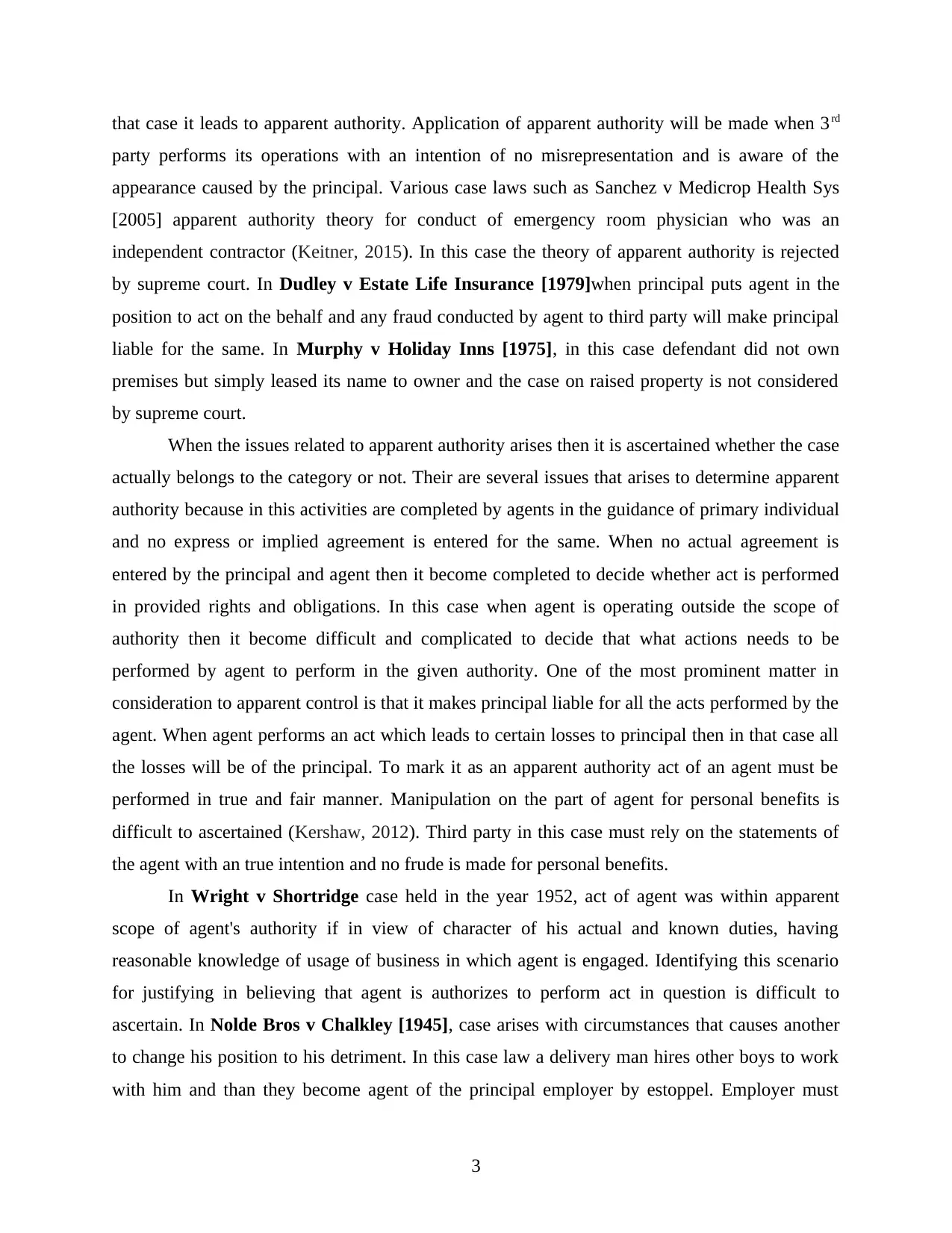
that case it leads to apparent authority. Application of apparent authority will be made when 3rd
party performs its operations with an intention of no misrepresentation and is aware of the
appearance caused by the principal. Various case laws such as Sanchez v Medicrop Health Sys
[2005] apparent authority theory for conduct of emergency room physician who was an
independent contractor (Keitner, 2015). In this case the theory of apparent authority is rejected
by supreme court. In Dudley v Estate Life Insurance [1979]when principal puts agent in the
position to act on the behalf and any fraud conducted by agent to third party will make principal
liable for the same. In Murphy v Holiday Inns [1975], in this case defendant did not own
premises but simply leased its name to owner and the case on raised property is not considered
by supreme court.
When the issues related to apparent authority arises then it is ascertained whether the case
actually belongs to the category or not. Their are several issues that arises to determine apparent
authority because in this activities are completed by agents in the guidance of primary individual
and no express or implied agreement is entered for the same. When no actual agreement is
entered by the principal and agent then it become completed to decide whether act is performed
in provided rights and obligations. In this case when agent is operating outside the scope of
authority then it become difficult and complicated to decide that what actions needs to be
performed by agent to perform in the given authority. One of the most prominent matter in
consideration to apparent control is that it makes principal liable for all the acts performed by the
agent. When agent performs an act which leads to certain losses to principal then in that case all
the losses will be of the principal. To mark it as an apparent authority act of an agent must be
performed in true and fair manner. Manipulation on the part of agent for personal benefits is
difficult to ascertained (Kershaw, 2012). Third party in this case must rely on the statements of
the agent with an true intention and no frude is made for personal benefits.
In Wright v Shortridge case held in the year 1952, act of agent was within apparent
scope of agent's authority if in view of character of his actual and known duties, having
reasonable knowledge of usage of business in which agent is engaged. Identifying this scenario
for justifying in believing that agent is authorizes to perform act in question is difficult to
ascertain. In Nolde Bros v Chalkley [1945], case arises with circumstances that causes another
to change his position to his detriment. In this case law a delivery man hires other boys to work
with him and than they become agent of the principal employer by estoppel. Employer must
3
party performs its operations with an intention of no misrepresentation and is aware of the
appearance caused by the principal. Various case laws such as Sanchez v Medicrop Health Sys
[2005] apparent authority theory for conduct of emergency room physician who was an
independent contractor (Keitner, 2015). In this case the theory of apparent authority is rejected
by supreme court. In Dudley v Estate Life Insurance [1979]when principal puts agent in the
position to act on the behalf and any fraud conducted by agent to third party will make principal
liable for the same. In Murphy v Holiday Inns [1975], in this case defendant did not own
premises but simply leased its name to owner and the case on raised property is not considered
by supreme court.
When the issues related to apparent authority arises then it is ascertained whether the case
actually belongs to the category or not. Their are several issues that arises to determine apparent
authority because in this activities are completed by agents in the guidance of primary individual
and no express or implied agreement is entered for the same. When no actual agreement is
entered by the principal and agent then it become completed to decide whether act is performed
in provided rights and obligations. In this case when agent is operating outside the scope of
authority then it become difficult and complicated to decide that what actions needs to be
performed by agent to perform in the given authority. One of the most prominent matter in
consideration to apparent control is that it makes principal liable for all the acts performed by the
agent. When agent performs an act which leads to certain losses to principal then in that case all
the losses will be of the principal. To mark it as an apparent authority act of an agent must be
performed in true and fair manner. Manipulation on the part of agent for personal benefits is
difficult to ascertained (Kershaw, 2012). Third party in this case must rely on the statements of
the agent with an true intention and no frude is made for personal benefits.
In Wright v Shortridge case held in the year 1952, act of agent was within apparent
scope of agent's authority if in view of character of his actual and known duties, having
reasonable knowledge of usage of business in which agent is engaged. Identifying this scenario
for justifying in believing that agent is authorizes to perform act in question is difficult to
ascertain. In Nolde Bros v Chalkley [1945], case arises with circumstances that causes another
to change his position to his detriment. In this case law a delivery man hires other boys to work
with him and than they become agent of the principal employer by estoppel. Employer must
3
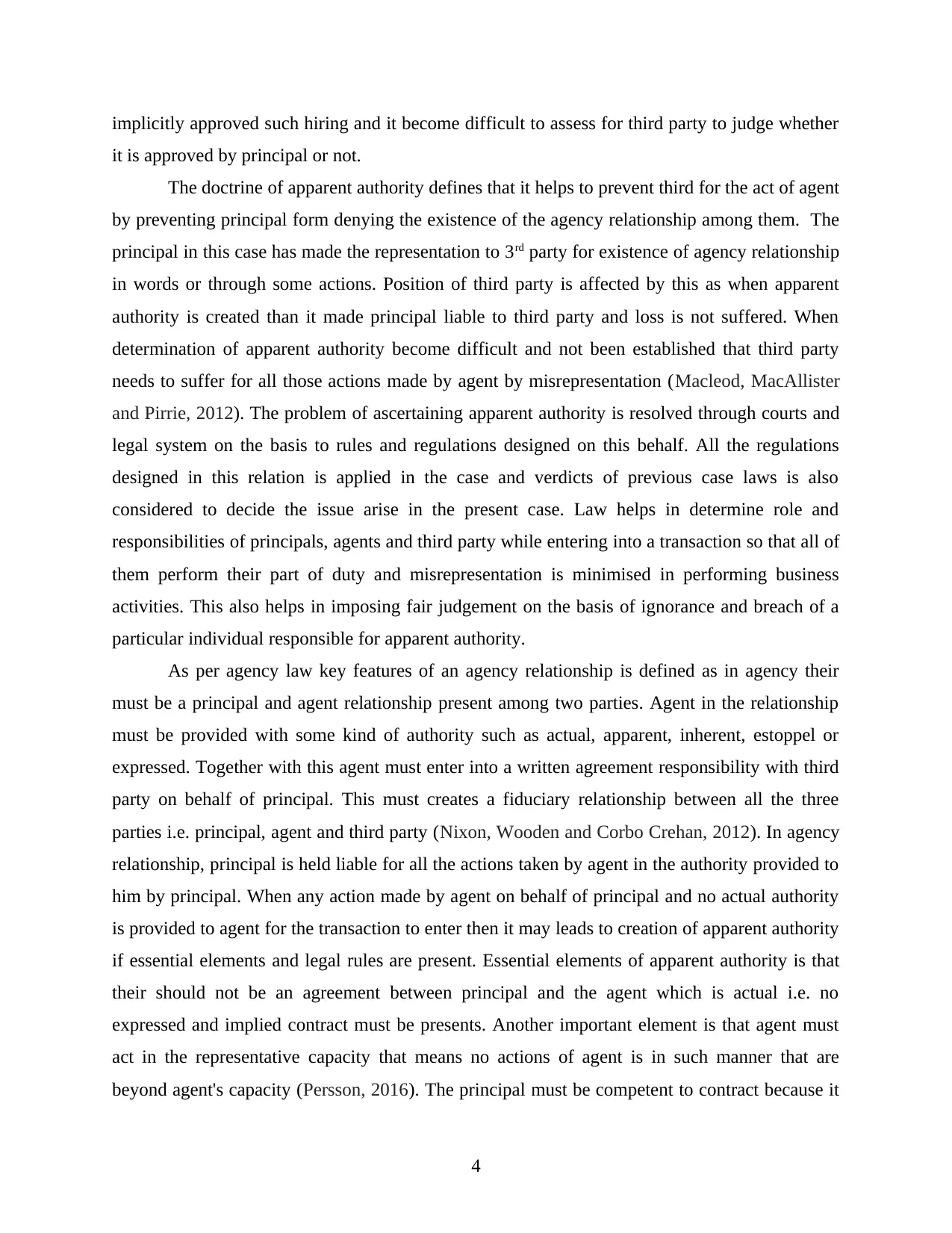
implicitly approved such hiring and it become difficult to assess for third party to judge whether
it is approved by principal or not.
The doctrine of apparent authority defines that it helps to prevent third for the act of agent
by preventing principal form denying the existence of the agency relationship among them. The
principal in this case has made the representation to 3rd party for existence of agency relationship
in words or through some actions. Position of third party is affected by this as when apparent
authority is created than it made principal liable to third party and loss is not suffered. When
determination of apparent authority become difficult and not been established that third party
needs to suffer for all those actions made by agent by misrepresentation (Macleod, MacAllister
and Pirrie, 2012). The problem of ascertaining apparent authority is resolved through courts and
legal system on the basis to rules and regulations designed on this behalf. All the regulations
designed in this relation is applied in the case and verdicts of previous case laws is also
considered to decide the issue arise in the present case. Law helps in determine role and
responsibilities of principals, agents and third party while entering into a transaction so that all of
them perform their part of duty and misrepresentation is minimised in performing business
activities. This also helps in imposing fair judgement on the basis of ignorance and breach of a
particular individual responsible for apparent authority.
As per agency law key features of an agency relationship is defined as in agency their
must be a principal and agent relationship present among two parties. Agent in the relationship
must be provided with some kind of authority such as actual, apparent, inherent, estoppel or
expressed. Together with this agent must enter into a written agreement responsibility with third
party on behalf of principal. This must creates a fiduciary relationship between all the three
parties i.e. principal, agent and third party (Nixon, Wooden and Corbo Crehan, 2012). In agency
relationship, principal is held liable for all the actions taken by agent in the authority provided to
him by principal. When any action made by agent on behalf of principal and no actual authority
is provided to agent for the transaction to enter then it may leads to creation of apparent authority
if essential elements and legal rules are present. Essential elements of apparent authority is that
their should not be an agreement between principal and the agent which is actual i.e. no
expressed and implied contract must be presents. Another important element is that agent must
act in the representative capacity that means no actions of agent is in such manner that are
beyond agent's capacity (Persson, 2016). The principal must be competent to contract because it
4
it is approved by principal or not.
The doctrine of apparent authority defines that it helps to prevent third for the act of agent
by preventing principal form denying the existence of the agency relationship among them. The
principal in this case has made the representation to 3rd party for existence of agency relationship
in words or through some actions. Position of third party is affected by this as when apparent
authority is created than it made principal liable to third party and loss is not suffered. When
determination of apparent authority become difficult and not been established that third party
needs to suffer for all those actions made by agent by misrepresentation (Macleod, MacAllister
and Pirrie, 2012). The problem of ascertaining apparent authority is resolved through courts and
legal system on the basis to rules and regulations designed on this behalf. All the regulations
designed in this relation is applied in the case and verdicts of previous case laws is also
considered to decide the issue arise in the present case. Law helps in determine role and
responsibilities of principals, agents and third party while entering into a transaction so that all of
them perform their part of duty and misrepresentation is minimised in performing business
activities. This also helps in imposing fair judgement on the basis of ignorance and breach of a
particular individual responsible for apparent authority.
As per agency law key features of an agency relationship is defined as in agency their
must be a principal and agent relationship present among two parties. Agent in the relationship
must be provided with some kind of authority such as actual, apparent, inherent, estoppel or
expressed. Together with this agent must enter into a written agreement responsibility with third
party on behalf of principal. This must creates a fiduciary relationship between all the three
parties i.e. principal, agent and third party (Nixon, Wooden and Corbo Crehan, 2012). In agency
relationship, principal is held liable for all the actions taken by agent in the authority provided to
him by principal. When any action made by agent on behalf of principal and no actual authority
is provided to agent for the transaction to enter then it may leads to creation of apparent authority
if essential elements and legal rules are present. Essential elements of apparent authority is that
their should not be an agreement between principal and the agent which is actual i.e. no
expressed and implied contract must be presents. Another important element is that agent must
act in the representative capacity that means no actions of agent is in such manner that are
beyond agent's capacity (Persson, 2016). The principal must be competent to contract because it
4
⊘ This is a preview!⊘
Do you want full access?
Subscribe today to unlock all pages.

Trusted by 1+ million students worldwide
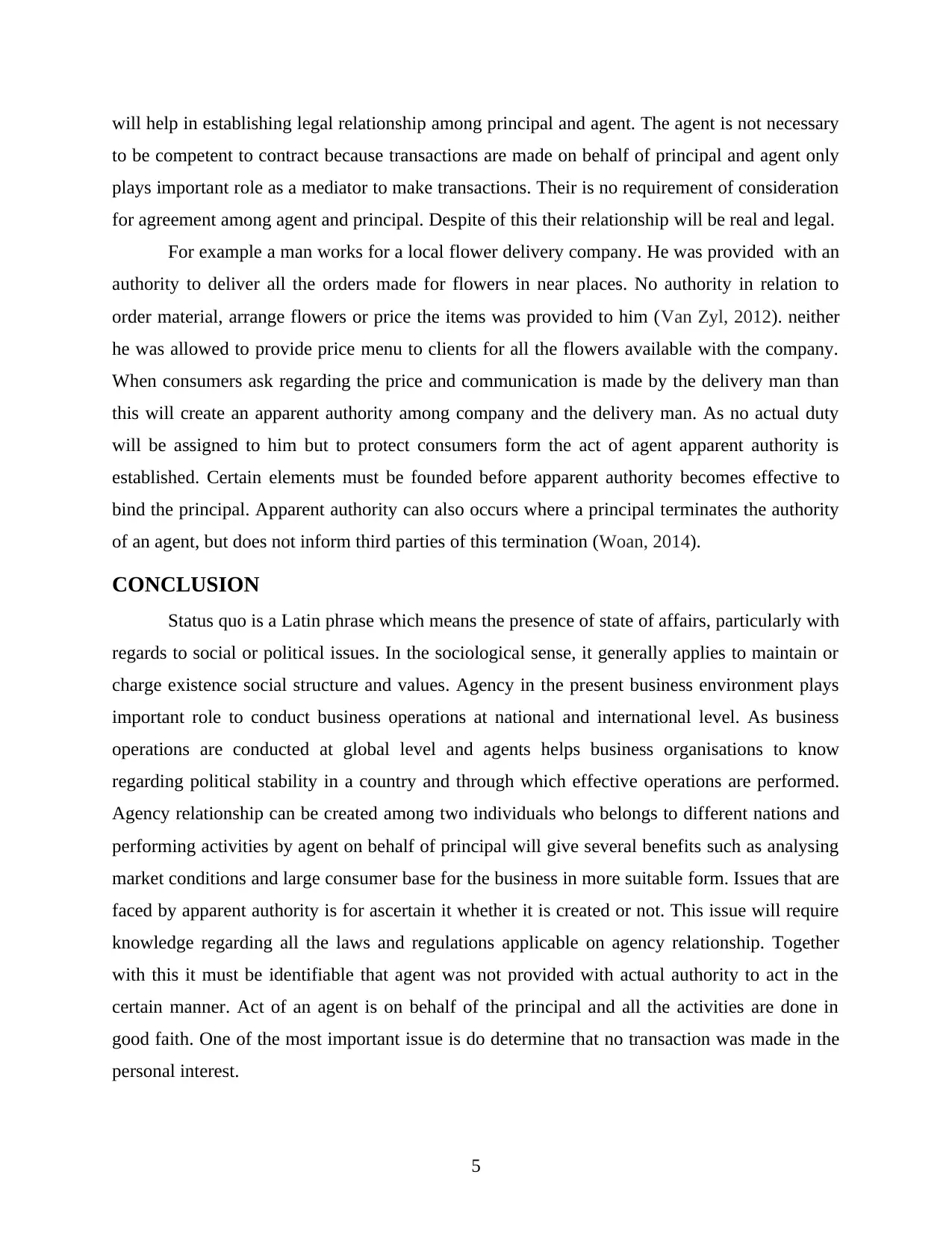
will help in establishing legal relationship among principal and agent. The agent is not necessary
to be competent to contract because transactions are made on behalf of principal and agent only
plays important role as a mediator to make transactions. Their is no requirement of consideration
for agreement among agent and principal. Despite of this their relationship will be real and legal.
For example a man works for a local flower delivery company. He was provided with an
authority to deliver all the orders made for flowers in near places. No authority in relation to
order material, arrange flowers or price the items was provided to him (Van Zyl, 2012). neither
he was allowed to provide price menu to clients for all the flowers available with the company.
When consumers ask regarding the price and communication is made by the delivery man than
this will create an apparent authority among company and the delivery man. As no actual duty
will be assigned to him but to protect consumers form the act of agent apparent authority is
established. Certain elements must be founded before apparent authority becomes effective to
bind the principal. Apparent authority can also occurs where a principal terminates the authority
of an agent, but does not inform third parties of this termination (Woan, 2014).
CONCLUSION
Status quo is a Latin phrase which means the presence of state of affairs, particularly with
regards to social or political issues. In the sociological sense, it generally applies to maintain or
charge existence social structure and values. Agency in the present business environment plays
important role to conduct business operations at national and international level. As business
operations are conducted at global level and agents helps business organisations to know
regarding political stability in a country and through which effective operations are performed.
Agency relationship can be created among two individuals who belongs to different nations and
performing activities by agent on behalf of principal will give several benefits such as analysing
market conditions and large consumer base for the business in more suitable form. Issues that are
faced by apparent authority is for ascertain it whether it is created or not. This issue will require
knowledge regarding all the laws and regulations applicable on agency relationship. Together
with this it must be identifiable that agent was not provided with actual authority to act in the
certain manner. Act of an agent is on behalf of the principal and all the activities are done in
good faith. One of the most important issue is do determine that no transaction was made in the
personal interest.
5
to be competent to contract because transactions are made on behalf of principal and agent only
plays important role as a mediator to make transactions. Their is no requirement of consideration
for agreement among agent and principal. Despite of this their relationship will be real and legal.
For example a man works for a local flower delivery company. He was provided with an
authority to deliver all the orders made for flowers in near places. No authority in relation to
order material, arrange flowers or price the items was provided to him (Van Zyl, 2012). neither
he was allowed to provide price menu to clients for all the flowers available with the company.
When consumers ask regarding the price and communication is made by the delivery man than
this will create an apparent authority among company and the delivery man. As no actual duty
will be assigned to him but to protect consumers form the act of agent apparent authority is
established. Certain elements must be founded before apparent authority becomes effective to
bind the principal. Apparent authority can also occurs where a principal terminates the authority
of an agent, but does not inform third parties of this termination (Woan, 2014).
CONCLUSION
Status quo is a Latin phrase which means the presence of state of affairs, particularly with
regards to social or political issues. In the sociological sense, it generally applies to maintain or
charge existence social structure and values. Agency in the present business environment plays
important role to conduct business operations at national and international level. As business
operations are conducted at global level and agents helps business organisations to know
regarding political stability in a country and through which effective operations are performed.
Agency relationship can be created among two individuals who belongs to different nations and
performing activities by agent on behalf of principal will give several benefits such as analysing
market conditions and large consumer base for the business in more suitable form. Issues that are
faced by apparent authority is for ascertain it whether it is created or not. This issue will require
knowledge regarding all the laws and regulations applicable on agency relationship. Together
with this it must be identifiable that agent was not provided with actual authority to act in the
certain manner. Act of an agent is on behalf of the principal and all the activities are done in
good faith. One of the most important issue is do determine that no transaction was made in the
personal interest.
5
Paraphrase This Document
Need a fresh take? Get an instant paraphrase of this document with our AI Paraphraser

The agency relationship as per law exists when one person or party engages another to
act for him in managing business operations. To improve legal position of agency implications of
rules and regulations for agent and principal must be strict and as per steps well defined in law.
For this relationship of agent and principal must be well defined and third party who is involved
in the transactions must know regarding agency relationship so that it can create more legal
compliances.
6
act for him in managing business operations. To improve legal position of agency implications of
rules and regulations for agent and principal must be strict and as per steps well defined in law.
For this relationship of agent and principal must be well defined and third party who is involved
in the transactions must know regarding agency relationship so that it can create more legal
compliances.
6

7
⊘ This is a preview!⊘
Do you want full access?
Subscribe today to unlock all pages.

Trusted by 1+ million students worldwide
1 out of 9
Related Documents
Your All-in-One AI-Powered Toolkit for Academic Success.
+13062052269
info@desklib.com
Available 24*7 on WhatsApp / Email
![[object Object]](/_next/static/media/star-bottom.7253800d.svg)
Unlock your academic potential
Copyright © 2020–2026 A2Z Services. All Rights Reserved. Developed and managed by ZUCOL.





